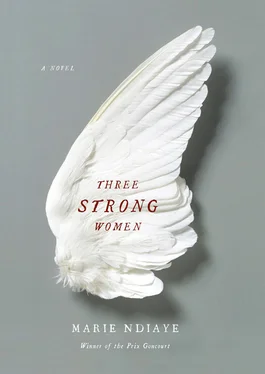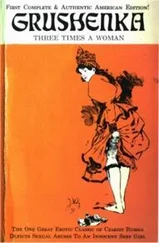There’s no point, no sense in having a father you literally can’t communicate with, whose feelings for you have always been in question, she thought, yet again, but this time calmly, not shaking with rage, impotence, and despondency as so often in the past when circumstance had brought up the fundamental differences of perception, outlook, and education between her and this cold, passionless man who’d spent only a few years in France, where she, a vulnerable person of strong feeling, had lived all her life.
And yet here she was, in her father’s house. When he’d called her, she had come.
If she’d possessed less of this capacity for emotion which he so heartily despised (lumping together, with his own daughter, the entire limp-wristed, feminized Western world), she would have found any excuse to avoid making such a journey … “And you would do me a great honor and give me the distinct pleasure if you were able — if you felt strong enough — to leave your family for a time, even for quite a while, and come here, to your father, because I’ve important things to say to you …”
Oh, how she already regretted having weakened, how she longed to return home now and get on with her life.
At the tiny sink in the kitchen a slim young girl in a T-shirt and threadbare skirt was washing some cooking pots.
The table was covered with dishes about to be served, Norah realized, to her father and herself.
She noticed roast chicken, couscous, saffron rice, a dark meat in a peanut sauce, and other dishes she could just make out under their steamy glass covers. The profusion was staggering. It was beginning to make her feel queasy.
She slipped between the table and the sink and waited until the girl, who was laboriously rinsing out a large stew pot, had finished.
The sink was so narrow that the pot kept hitting the edges or the tap and, since there was no draining board, the girl had to crouch to set the vessel down on the floor, where she’d spread out a dish towel on which to dry it, a sight that once again exasperated Norah, who quickly washed her hands, all the while smiling and nodding to the girl.
And when she’d asked her name and the girl, after a brief silence — as if, Norah thought, to give her answer a dignified setting — had replied, “Khady Demba,” her calm assurance, firm voice, and limpid gaze both surprised and soothed Norah, calming her jumpy weariness and feelings of irritation and resentment.
At the end of the corridor her father’s voice rang out, calling her impatiently.
She made haste to rejoin him and found him in a state of some annoyance, anxious to tuck into the prawn and fruit tabbouleh Masseck had served in the two plates set opposite each other.
She’d hardly sat down when he started eating greedily, with his face almost in his plate, and this voraciousness, entirely devoid of polite pretense or small talk, was so much at odds with the old-fashioned manners of this rather affected man that Norah nearly asked him if he’d been depriving himself of food, thinking that he was quite capable — if his financial difficulties were such as she supposed them to be — of trying to impress her by loading this dinner with all the provisions of the three preceding days.
Masseck brought out one dish after another, at such a pace that she couldn’t keep up.
She was relieved to see that her father was paying no attention to what she ate.
He only raised his head to scrutinize gluttonously and suspiciously what Masseck had just put on the table, and when at one point he looked furtively at Norah’s plate, it was with such childlike apprehension that she realized he was simply making sure Masseck had not served her more generously than him.
That really upset her.
Her father — normally so loquacious, so full of fine words — remained silent. The only sounds to be heard in the desolate house were the clatter of plates, the slip-slap of Masseck’s feet on the tiles, and perhaps the rustle of the poinciana’s upper branches brushing against the tin roof. She wondered vaguely whether the lone tree was calling out in the night for her father to come.
He went on eating, moving from the grilled lamb to the chicken in sauce, hardly pausing for breath between mouthfuls, joylessly stuffing himself.
For dessert, Masseck put a mango cut in pieces before him.
He pushed one piece into his mouth, then another. Norah saw him chewing with difficulty, and trying to swallow. In vain.
He spat out the mango pulp onto his plate.
Tears were pouring down his cheeks.
Norah felt her own cheeks burning.
She got up, heard herself mumbling something, she couldn’t tell what, went over and stood behind him, and then didn’t know what to do with her hands, never before having found herself in a position either to comfort her father or to show him anything other than a stiff, forced respect tinged with resentment.
She turned around, looking for Masseck, but after clearing the table he’d left the room.
Her father was still weeping silently, expressionless.
She sat down next to him and leaned forward to bring her head as close as possible to his tear-streaked face.
She could smell, under the odor of the food and the spicy sauces, the sickly sweet scent of the rotting flowers of the big tree, and since her father kept his head lowered, she could see how grubby the shirt collar was around his neck.
She remembered a piece of news that two or three years earlier her brother Sony had passed on but that her father hadn’t seen fit to divulge to her or her sister. She’d resented this, but before long she’d forgotten both the news and her bitterness at not having been told. The two things now went through her mind simultaneously and as a result her tone was rather acerbic even though she’d tried to make her voice sound comforting.
“Tell me, where are your children?” she asked.
She remembered that he’d fathered twins but couldn’t recall what gender they were.
He looked at her, distraught.
“My children?”
“The last ones you had. Or so I understand. Has your wife taken them with her?”
“The little girls? Oh, they’re here, yes,” he murmured, and turned his head. It was as if he were disappointed, as if he’d hoped that she would talk about something he didn’t know, whose implications he hadn’t grasped, something that, in a strange, magical way, would save him.
She couldn’t contain a slight shiver of vengeful spite.
So Sony was the only son of this man who didn’t care much for girls, or have much time for them.
Overwhelmed, weighed down by useless, crucifying females who weren’t even pretty, thought Norah calmly, thinking of herself and her sister; they’d always had, for their father, the irremediable defect of being too much like him, that is, quite unlike their mother, and attesting to the pointlessness of his marriage to a Frenchwoman, because what good had it done him? No almost-white children, no well-built sons …
And it had been a failure.
Upset, overwhelmed by a feeling of ironic compassion, she laid her hand lightly on his shoulder.
“I’d like to meet them,” she said, adding at once, so as not to give him time to ask what she meant, “your two daughters, the little girls.”
Her father shook her hand off his fat shoulder in an involuntary gesture signifying that nothing could justify such familiarity on her part.
He rose heavily and wiped his face on his sleeve.
He pushed open an ugly glazed door at the other end of the room, and switched on the solitary bulb that lit another long, gray concrete corridor, off which, she recalled, doors opened onto small square rooms like monastic cells that once were inhabited by her father’s numerous kin.
From the way their footsteps and her father’s loud irregular breathing echoed in the silence, she was sure that the rooms were now empty.
Читать дальше












